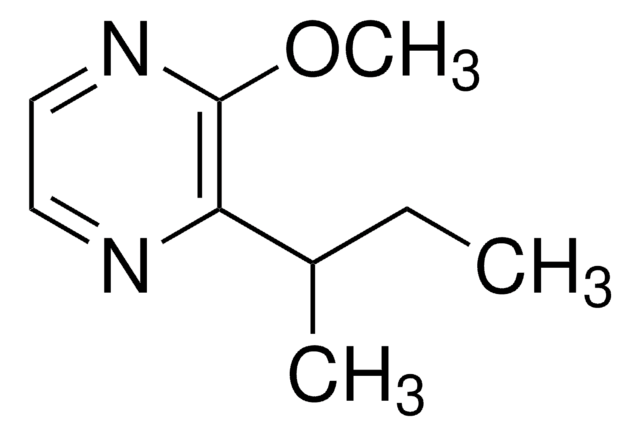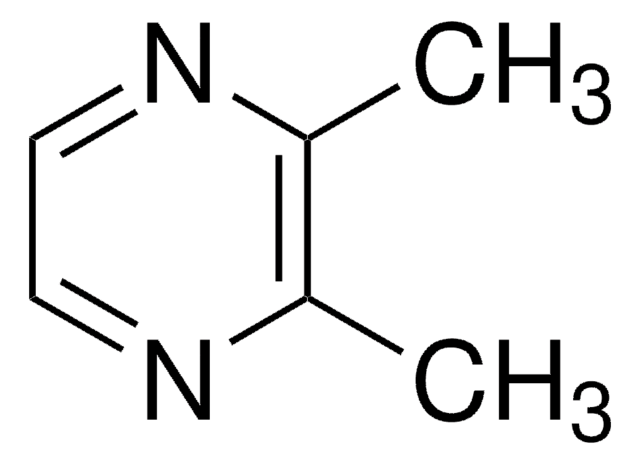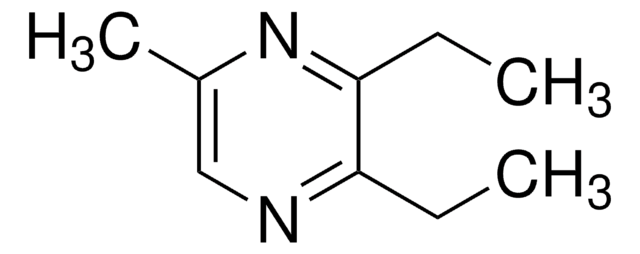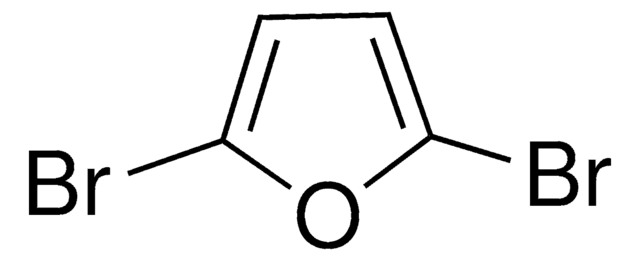All Photos(1)
About This Item
Empirical Formula (Hill Notation):
C9H14N2O
CAS Number:
Molecular Weight:
166.22
EC Number:
MDL number:
UNSPSC Code:
12352100
PubChem Substance ID:
NACRES:
NA.22
Assay:
99%
Recommended Products
Quality Level
Assay
99%
refractive index
n20/D 1.49 (lit.)
density
0.99 g/mL at 25 °C (lit.)
SMILES string
COc1nccnc1CC(C)C
InChI
1S/C9H14N2O/c1-7(2)6-8-9(12-3)11-5-4-10-8/h4-5,7H,6H2,1-3H3
InChI key
UXFSPRAGHGMRSQ-UHFFFAOYSA-N
Looking for similar products? Visit Product Comparison Guide
Related Categories
General description
2-Isobutyl-3-methoxypyrazine, a potent bell-pepper odourant, has been found to bind to cow olfactory mucosa homogenate.
Application
2-Isobutyl-3-methoxypyrazine has been employed as a model odorant molecule during an electrochemical assay for the detection of odorant molecules based on a rat odorant-binding protein (rOBP3).
Signal Word
Warning
Hazard Statements
Precautionary Statements
Hazard Classifications
Eye Irrit. 2 - Skin Irrit. 2 - STOT SE 3
Target Organs
Respiratory system
Storage Class Code
10 - Combustible liquids
WGK
WGK 3
Flash Point(F)
176.0 °F - closed cup
Flash Point(C)
80 °C - closed cup
Personal Protective Equipment
dust mask type N95 (US), Eyeshields, Gloves
Choose from one of the most recent versions:
Already Own This Product?
Find documentation for the products that you have recently purchased in the Document Library.
Emilie Barou et al.
Bioelectrochemistry (Amsterdam, Netherlands), 101, 28-34 (2014-07-18)
We developed an electrochemical assay for the detection of odorant molecules based on a rat odorant-binding protein (rOBP3). We demonstrated that rOBP3 cavity binds 2-methyl-1,4-naphtoquinone (MNQ), an electrochemical probe, as depicted from the decrease of its electrochemical signal, and deduced
P Pelosi et al.
The Biochemical journal, 201(1), 245-248 (1982-01-01)
2-Isobutyl-3-methoxypyrazine, a potent bell-pepper odorant, binds to cow olfactory mucosa homogenate. The receptor is saturable in the micromolar range and is competitively inhibited by other bell-pepper odourants, but not by other pyrazines of different odours. Other tissues do not bind
Maria Staiano et al.
Biopolymers, 89(4), 284-291 (2007-12-22)
The effects of hydrostatic pressure on the structure and stability of porcine odorant-binding protein (pOBP) in the presence and absence of the odorant molecule 2-isobutyl-3-methoxypyrazine (IBMP) were studied by steady-state and time-resolved fluorescence spectroscopy as well as by molecular dynamics
Katja Suklje et al.
Journal of agricultural and food chemistry, 60(37), 9454-9461 (2012-09-06)
Grape berries were classified according to diameter and total soluble solids (TSS) to study the effect of light and temperature on methoxypyrazines (MPs), glutathione (GSH), and hydroxycinnamates (HCAs) during the ripening of Sauvignon blanc. The light exposure of the fruiting
Alfredo Koch et al.
Physiologia plantarum, 145(2), 275-285 (2012-01-10)
The roles of light and temperature in the accumulation of the vegetal impact compound 2-methoxy-3-isobutylpyrazine (MIBP) in grape (Vitis vinifera L.) berries were determined. Individual clusters were exposed to various light intensities using neutral density shade cloth before ripening, during
Our team of scientists has experience in all areas of research including Life Science, Material Science, Chemical Synthesis, Chromatography, Analytical and many others.
Contact Technical Service








